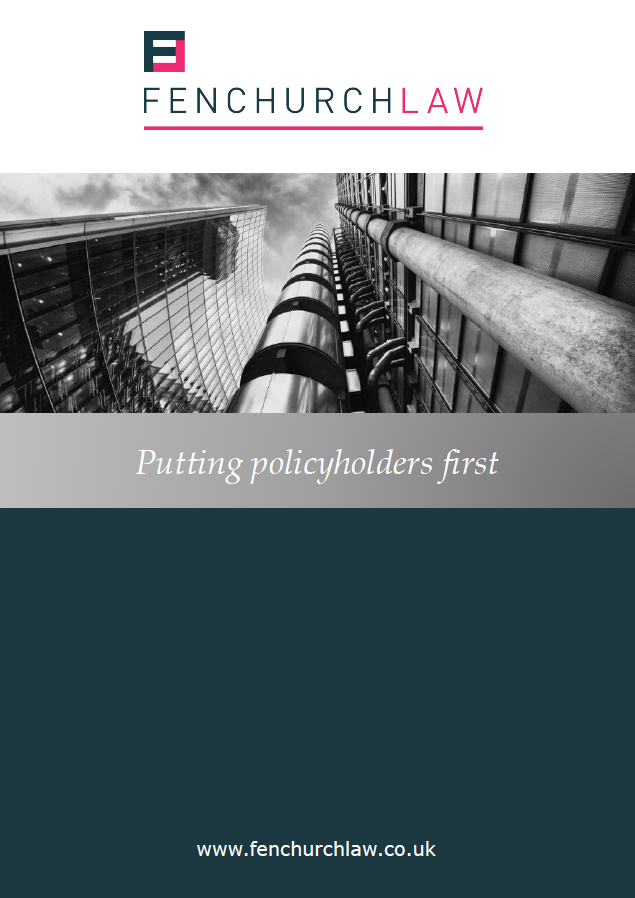
Ristorante Limited t/a Bar Massimo v Zurich¬ [2021]: – Food for thought about the questions in insurance applications
This recent High Court decision considers the proper construction of questions put to an insured in insurance applications, and the circumstances in which they can amount to waiver.
Background
Ristorante Limited (“Ristorante”) was the leaseholder of a bar and restaurant in Glasgow (“the Property”). Ristorante took out an insurance policy with Zurich in 2015, which renewed in 2016 and 2017 (“the Policy”). Prior to inception of the Policy, and at each renewal, Ristorante confirmed that the following state of affairs was true:
“No owner, director, business partner or family member involved with the business:
i) …
ii)…
iii) Has ever been the subject of a winding up order or company/individual voluntary arrangement with creditors, or been placed into administration, administrative receivership or liquidation
iv) …
(“the Insolvency Question”)
On 3 January 2018, a significant fire broke out at the Property. After being notified of a claim, Zurich purported to avoid the Policy on the basis that Ristorante failed to make a fair presentation of the risk. In particular, it asserted that Ristorante misrepresented/failed to disclose that three of its directors had been directors of companies which previously entered liquidation (“the Other Insolvencies”), and that cover would not have been provided had they been disclosed.
Issues
There were two issues for the Court to determine at a trial of preliminary issues:
- Whether, on the true construction of the Insolvency Question, there was a misrepresentation/non-disclosure; and
- Whether, by asking the Insolvency Question in the way that it did, Zurich waived disclosure of the Other Insolvencies.
The Decision
The Judge, Mr Justice Snowden, found for Ristorante on both issues.
On the first issue, the Judge observed that the Insolvency Question limited its enquiry to any “owner, director, business partner or family member involved with the business”. There was no express enquiry in relation to any corporate bodies, and, accordingly, a person completing the Insolvency Question would not come to it “with any predisposition to think that the Defendant was interested in that information.”
The Judge also relied on cases such as R&R Developments v AXA [2010] 2 All ER (Comm) 527 (see our previous article on the case here) and Doheny v New India Assurance [2005] 1 All ER (Comm), both of which also addressed the proper construction of insolvency questions. The Judge found that a reasonable insurer in 2015 would be expected to know of those decisions, and to have understood the importance, if it wished to make enquiries of the insolvency of companies with which the insurer’s directors were involved, of using language which referred to those companies.
Zurich made a number of further arguments about the correct interpretation of the Insolvency Question, which included an argument that the words “has ever been the subject of” were sufficient, without more, to require disclosure of companies with which Ristorante’s directors were involved. Unsurprisingly, the Judge rejected that construction, noting that it made neither grammatical nor legal sense.
Zurich also said that, regardless of the precise wording used, a reasonable broker would have understood the Insolvency Question to mean that the Other Insolvencies were material facts which needed to be disclosed. However, absent any evidence on what a “hypothetical reasonable broker” would have done, the Judge rejected that argument.
On the second issue, the Judge, having regard to the authorities on the effect of asking a limited question, held that Zurich waived disclosure of the Other Insolvencies. Although Zurich contended that past insolvencies was a relevant moral hazard from the perspective of an insurer and “certainly information about which they would ordinarily expect to be told”, the Other Insolvencies related to a different set of persons identified in the Insolvency Question. Therefore, it was reasonable for Ristorante to infer that Zurich had no interest in them.
Summary
Ristorante v Zurich is another in a recent run of policyholder friendly decisions, and a timely reminder that Insurers’ attempts to re-write questions in insurance applications, when doing so would require a completely different meaning to be given to them, will be impermissible.
Alex Rosenfield is a Senior Associate at Fenchurch Law
Other news
Timing is everything – Makin v QBE and the cost of not complying with a condition precedent
3 July 2025
This recent decision from the High Court provides a powerful reminder of the consequences of not complying with a…
You may also be interested in:
Archives
Categories
- Fenchurch Law Webinars
- Stonegate
- Newsletter
- Events
- Webinars
- Comparing German and English Insurance Law – A Series
- Construction Risks
- Operations
- Business Development
- Construction & Property Risks
- News
- International Risks
- Legislation
- Financial & Professional Risks
- Case Law
- Professional Risks
- Press Release
- Uncategorized
- The Good, the Bad and the Ugly



